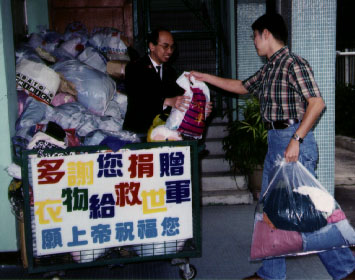 Thrift stories
Thrift storiesSelling at low prices helps the needy



 Thrift stories
Thrift stories
Selling at low prices helps
the needy
By Vivian Lai
“The stuff here is not expensive. I go here every day to see whether there is anything I need. Besides, the clothes here suit me,” said Miss Liu.
Miss Liu is one of many who benefit from thrift stores. In Hong Kong, thrift stores are organized by voluntary organizations. The Salvation Army is but one of them.
The Salvation Army has been running its “recycling programme” in Hong Kong since the 1940s. It welcomes the public to donate items and then gives the donations to those in need or sells them at low prices in the thrift stores.
The first thrift store was opened in Wan Chai in the 1960s. Now there are six branches in Hong Kong. They are going to set up a seventh store later this year.
Mr. Simon Wong, director of public relations for the Salvation Army, said, “We welcome all kinds of goods, especially household appliances, because many people need them. Furniture is not preferred, because we do not have enough room to store it.”
People receiving public allowance from the government can get the goods there free. And anyone can buy what they need in the thrift stores at about 10 per cent of the market prices.
“We found that allowing the needy to purchase at a low price makes them feel better, because it may offend the dignity of some people if we give them goods free,” said Mr. Wong.
“The income generated from the service is allocated to the welfare fund or to finance service programmes that receive no assistance from the government,” he said.
The Hong Kong Red Cross is another organization that receives goods from the public in order to help those in need.
Mr. Wilson Wong is the assistant secretary general for international service of the Hong Kong Red Cross. He said, “The donations are transferred to hospitals and homes for the elderly. We receive only new goods from local as well as overseas manufacturers.
“Sometimes there is an unexpected incident and the Social Service Department approaches us for help. We then contact manufacturers and ask them to donate necessities and medicines to the victims.”
Oxfam is yet another organization which operates a thrift store. Its store is located at the Swire House in Central. All the donations received are sold in the store at low prices.
All these thrift stores are welcomed by people in need. The Salvation Army collects donations once a month from the public. Some housing estates contact the Salvation Army to organize collection services.
“The service provided by the thrift stores makes good use of resources in society and also helps the people in need,” said the Salvation Army’s Mr. Wong.
Although the organization have no difficulties in finding sources and clients, they face other problems.
“We do not have enough space to store the second-hand goods. Besides, the areas of thrift stores are not big enough. Space is the biggest problem,” Mr. Wong added.
The Hong Kong Red Cross donates materials to disaster victims overseas. However, it faces various difficulties.
Said Mr. Wong of the Red Cross: “If you want to transfer goods to disaster areas, you have to spend a large sum of money on transportation. At the same time, some staff have to follow the case. Therefore, human resources is another problem.
“In such cases, it is more convenient if people donate cash. This is because we can use the money to purchase what the victims need in or near the disaster areas.
“Not only could it save the transportation fee, it also helps the disaster areas to recover from economic recession.”
All the three organizations agree that thrift stores provide benefits and assistance to people in need.
“I think we are doing a good job. But of course,” said Mr. Simon Wong, “it would be the best if no one needed our services, as this would mean everyone could afford to buy new stuff.”
